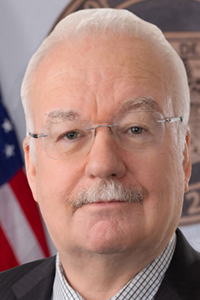Sen. John Kavanagh wants to give voters a new chance to decide if he and his colleagues are worth more than the $24,000 annual salary they now get for what are supposed to be part-time jobs.
The Fountain Hills Republican is proposing a measure for the 2026 ballot to put in an automatic inflation adjustment. Put simply, if approved, lawmakers would get an annual boost every year tied to the Consumer Price Index.
More to the point, unlike the current system, lawmakers would never again have to seek voter approval for future pay hikes.
Kavanagh, the longest continually serving legislator, acknowledged that voters have had multiple chances in the past to conclude that the $24,000 figure, approved in 1998, is insufficient. But they turned down every effort, most recently a 2014 proposal to set the figure at $35,000.
But he said that this is different because it would use the current salary as a base and then just make annual adjustments.
So, had his proposal been in effect now, the lawmakers being sworn in Monday would get a $648 raise based on the most recent CPI report, which pegged annual inflation at 2.7%.
And what of the fact that the Legislature is supposed to be a part-time job?
Kavanagh said lawmakers have been meeting most years into at least May despite the 100-day deadline. Plus there are hearings and other meetings throughout the year.

That, he said, precludes many legislators from having outside jobs.
“There aren’t many people looking around for half-time workers,” said Kavanagh.
But even if being a lawmaker is considered a half-time gig, he said that a $48,000 salary – what he really thinks it should be with inflation since that last raise in 1998 – is not unreasonable, even if it is higher than the most recent median income figures for Arizonans. He said it is based on the responsibilities lawmakers have.
“I mean, we’re not digging ditches, we’re not working a fast-food restaurant line,” Kavanagh said.
The issue of legislative pay is complex.
Under the Arizona Constitution, voters get the last word on their salaries.
The way the system is designed is that the Commission on Salaries for Elective State Officers is supposed to meet on a biennial basis. And among its chores is to make recommendations for legislative salaries and ask voters to approve them.
The panel did make such recommendations in 2000, 2002, 2004, 2006 and 2008 – all rejected by voters.
Then-Gov. Jan Brewer refused to name members to the panel for four years, saying it was inappropriate to consider pay hikes for elected officials during “difficult times.” She did finally make selections in time for 2014, though she openly opposed that proposal to boost pay to $35,000. It fared even worse than the others, with just 32% of voters approving the plan.
Since then, however, the commission has made no recommendations.
In fact, the commission exists only on paper as Doug Ducey, who succeeded her, did not fill the two gubernatorial vacancies when they developed on the five-member board, one of whom is supposed to chair the panel. Kirk Adams, who was his chief of staff, said his boss shared the concerns about asking voters to hike salaries for elected officials during difficult economic times.
Current Gov. Katie Hobbs has not resurrected the panel, though there was no immediate response from her office about why. And that lack of action means that, absent what Kavanagh wants, there is currently no way for lawmakers to even get voters to consider a pay hike.
The senator said his plan is a better alternative — and not just because it doesn’t rely on a governor to set the process in motion. If approved, the annual adjustments would be automatic and not dependent on the commission.
What he wants, however, presumes that voters are inclined to believe that their lawmakers who also get a daily allowance of at least $3,500 a year to spend as they will – more for out-county-legislators – deserve more money.
But Kavanagh believes his SCR1003 should be an easier sell than the bigger increases that voters have turned down in the past. And it starts, he said, with the fact that they decided in 1998 that $24,000 was an appropriate salary.
“I do not believe that the voters in 1998 when they said ‘You should get $24,000’ intended for that amount to be eroded nearly in half due to inflation,” Kavanagh said.
In fact, an inflation calculator at the U.S. Bureau of Labor Statistics figures that you’d need $46,085 in current dollars to buy as much as you could for $24,000 in 1998.
Kavanagh said even if the commission is reactivated, he’s convinced his proposal is better. And at least one key, he said, is that if it is approved, it takes voters out of the equation for future years.
“Very often, the mood of the public based on other events the Legislature’s associated with sometimes determines whether they’re for us or against us,” Kavanagh said.
Put another way, his plan would make it irrelevant whether voters like or hate what lawmakers are doing.
Anyway, Kavanagh said, there is precedent for what he is proposing.
In 2006 voters approved creation of the state’s first-ever minimum wage. That set the floor for workers in Arizona at $6.75 an hour, versus the federal minimum of just $5.15.
More to the point, the law requires annual inflation adjustments.
That measure, along with an update in 2016, has boosted the state minimum to $14.70; the federal minimum remains at $7.25, a figure that Congress hasn’t adjusted since 2009.
“If the voters said inflation’s OK for the minimum wage, I don’t think voters would be opposed to this,” Kavanagh said.
The senator did not mention, however, that he actually opposed the ballot measure raising the minimum wage. But he did argue that an inflation adjustment is more justified for lawmakers than those at the bottom of the pay scale.
“Most people only work in a minimum wage slot for a short period of time before they either get a promotion or a longevity raise,” he said. “There is no promotion or longevity raises for legislators.”
That still leaves the fact that he and everyone else who voluntarily runs for the Legislature knows up front that the salary is just $24,000 a year.
“I accept that,” Kavanagh said. “And if my referral goes to the ballot and the voters vote it down, I accept that.”
But he said the failure of officials to appoint members to the salary commission means voters “have been deprived that opportunity” since the last ballot measure in 2014.
“So let’s give it to them,” he said.
While the salary is just $24,000, there are other perks.
The minimum per diem allowance is $35 a day for those living in Maricopa County for what is supposed to be a 100-day session. In essence, that’s a payment for them going to the Capitol, though they also get the allowance for weekends and other days the Legislature is not in session.
That figure gets cut to $10 a day after 120 days.
Out-county lawmakers get a figure equal to the federal General Services Administration rate, the figure used by the federal government to reimburse employees on the road. That is currently about $250 a day, covering both lodging and an allowance for meals.
Then there’s a pension. For those first elected to any office before 2012, it can hit 80% of what they were earning after 20 years; there are lower benefits for newer elected officials.
But there’s also a sweetener for those who move from the Legislature to another elective office: Their benefits are calculated on the highest five years of their earnings.
So a lawmaker who serves 16 years at the Capitol at $24,000 but then becomes the state treasurer at $70,000. That means after just five years in the new job that person is entitled to a pension of $52,500 – plus annual cost-of-living adjustments.
History of legislative pay:
Original 1912 Arizona Constitution — $7 per day
1932 initiative — $8 per day
1958 referendum — $3,600 per year
1968 referendum — $6,000
1980 referral by salary commission approved by voters increased to $15,000
1998 referral by salary commission approved by voters increase to current $24,000


